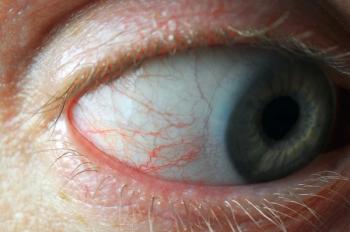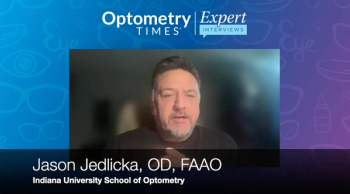
Low-cost contact lens site looks to improve compliance, drive exams
Contact lens retail site Hubble launched last Tuesday, offering contact lens wearers daily disposable contact lenses at a lower price and planning to drive patients into OD offices for exams.
The subscription-based contact lens retailer, whose name was inspired by the telescope, won’t fill expired contact lens prescriptions, according to cofounders and co-CEOs Jesse Horwitz and Ben Cogan. Consumers interested in buying contact lenses from Hubble need an eye exam first, they say.
“We are sending patients to doctors,” says Horwitz. “Those doctors have Hubble fitting sets. It is the doctor’s discretion to fit Hubble. We have some patients going to doctors who the majority of the time haven’t fit the patient into Hubble.”
“Hubble provides the consumer with yet another choice in online contact lens sales. We can hope this service does a better job verifying contact lens prescriptions because it will be providing a private-label lens. As such, it will rely heavily on its lens being used by practitioners, which should aid in the verification process and protect consumer safety. I question how successful this group will be among private-practice optometrists who rely on the sales of contact lenses for a revenue stream.”
Related:
Hubble daily disposable contact lenses are made from methafilcon A material by St. Shine Optical Co. with powers ranging from -0.75 D to -8.00D, a base curve of 8.6 mm, and a diameter of 14.2 mm.
St. Shine Optical is a contract and private-label contact lens manufacturer based in Taiwan.
The company plans to launch toric daily disposable lenses in mid 2017 and aims to launch a multifocal lens in 2018.
How Hubble works
Consumers interested in purchasing Hubble daily disposable contact lenses from the retail site enter their contact lens powers and the name of their doctor. Hubble will verify patient prescriptions before shipping.
Next, consumers choose their subscription level of monthly 60-lens shipments or one yearly supply shipment. Consumers can cancel or modify their subscriptions at any time.
A monthly shipment costs $30 each, and an annual supply costs $264-a savings of $96, according to the site.
All consumers receive their first 30 lenses for free.
Related:
For consumers who do not have a valid contact lens prescription, Hubble will schedule an appointment with a participating doctor in the area. On the Hubble website, consumers enter their personal information and preferred appointment time windows to schedule an appointment.
After the exam, consumers who were successfully fit with Hubble lenses return to the site to enter their contact lens prescription and preferred subscription option.
Horwitz says that during the hour-long phone interview for this story, 14 people asked for eye exam appointments through the Hubble site.
Not all ODs think that Hubble is offering a service.
“Hubble is not driving patients into offices,” says
What started with just a couple online spectacle retailers has evolved into online refractions, she says.
“Hubble achieves a new level of threat in marketing an ‘off brand’ daily disposables,” she says. “Of course, the patient will not have a prescription written for Hubble contact lenses, so it seems logical that Hubble actively drive patients to the doctor, at first. But how hard will they try when that patient comes up for renewal, and how many of us will receive a call from our own patients asking for us to change their brand?”
Dr. Brimer expresses concern that if ODs are not associated with Hubble, their patients will be actively driven elsewhere. This is a new level of threat in which an online retailer influences both the exam and the sale.
“It is unfortunate that we are not seeing equally visible campaigns teaching patients about the value of a real eye exam and the potential consequences of sidestepping the doctor,” she says.
Hubble wants to improve compliance
Cogan says Hubble came about after he realized he was overwearing his daily disposable contact lenses due to their high cost. He realized he could apply the model from his previous employer Harry’s, a subscription-based direct-to-consumer razor company, to contact lenses.
“Harry’s is similar to Warby Parker in that they’re charging a much reduced price for an important product,” he says. “Seeing how we can offer a high-quality product to patients a lower price while helping them be more compliant was a real priority.”
Hubble investor Brian Levy, OD, MSc, believes that daily disposable lenses are the healthiest choice for patients. He says they haven’t gained the market share in the U.S. that they did around the world, and one of the biggest reasons why is price.
“I saw there was an opportunity to bring this healthiest form of contact lens wear to more people simply by lowering the cost and increasing the efficiency of getting the lenses and hopefully getting people to actually throw them away,” he says.
Dr. Levy is currently chief medical officer at Aerie Pharmaceuticals and former chief medical officer for Bausch + Lomb.
“We thought that if we could source a high-quality lens and bring down the price, we could discourage overwearing,” says Horwitz. “If people wore our lenses in a compliant way, it would maximize health outcomes for them.
“Because patients are automatically getting a new shipment each month, that should help compliance. We wanted to make sure patients weren’t overwearing lenses because they didn’t get a chance to get more.”
Related:
The role of the OD
Cogan and Horwitz acknowledge the important role optometrists play in contact lens prescribing and want to work with ODs to help patients better afford daily disposable contact lenses.
“Obviously we need doctors who are willing to fit the lenses and need a way to work with them where they retained their independence,” Horwitz says. “They are free to exercise their clinical judgement to fit the patient with another lens.”
Hubble is seeking doctors who are well reviewed with good reputations in locations where the company finds its customer demographic, namely major cities.
“Our customers are often young,” says Sunny Gosain, director of optometric partnerships and internal strategy. “We look for doctors who are comfortable dealing with this population and doctors who share our values. There’s a huge untapped potential to help patients by moving people to daily lenses. We want to make sure doctors making an informed decision about having a Hubble fitting set in their office.”
The company realizes that ODs who agree to work with Hubble may not always prescribe Hubble lenses.
Because Hubble lenses are available only in spherical powers, astigmatic or presbyopic patients won’t be good candidates. Nor would patients with underlying ocular pathology affecting potential contact lens wear.
Gosain points out that participating doctors keep all exam fees, regardless of what contact lens, if any, is prescribed. In addition, he says, patients referred from the Hubble site have a probability of buying eyeglasses, bringing in family and friends, or posting positive social media reviews.
Horwitz says there is no financial transaction at all between Hubble and participating doctors.
Related:
Dr. Levy says the company had to be sure that eyecare practitioners understood that Hubble isn’t in competition with them.
“The profit margin for contact lenses is low,” he says. “You can still make more money on an exam than on materials, at least in the contact lens world. This is going to be a business serving not only patients but the doctors who are participating.”
Currently, 200 to 400 doctors have Hubble fitting sets. Almost all of those doctors are optometrists with only a handful of ophthalmologists, says Gosain. Most of Hubble’s outreach has been directed to ODs.
Aside from the obvious concerns about verification, proper fitting, and patient safety, says Optometry Times Editorial Advisory Board member Dori Carlson, OD, Hubble assumes its contact lenses will be comfortable for all patients.
“We all know that is simply not the case,” she says.
Hubble manufacturing and material
In searching for a contact lens manufacturing partner, Cogan and Horwitz evaluated lenses from several dozen manufacturers, including conversations with major manufacturers, before deciding on St. Shine.
“St. Shine is the number-two manufacturer in the Japanese market, second only to Johnson & Johnson,” Horwitz says. “It penetrated with great success into a large market. St. Shine has had FDA approval and distribution as private label for 15 years. This gave us comfort.”
Levy acknowledged that Hubble lenses are made from an older material.
“The material to me is not the be-all and end-all for contact lenses,” he says. “From a health point of view, there is very little difference between silicone hydrogel and older materials. There is more oxygen and you’ll get less edema, but I don’t believe that will make much difference.”
Contact lenses as a commodity
Although the company is providing 30 free lenses to each customer, Cogan and Horwitz have no concerns about the perception of contact lenses as a commodity.
“It’s useful to us when we’re advertising to get people onto our site and into the doctor flow,” says Cogan.
Related:
Gosain says that for patients to receive the first two weeks of lenses, they have already had an eye exam. Nothing about that says commodity, he says.
“A lot of people today do view contact lenses as a commodity,” says Dr. Levy. “What doctors want at the end of the day is to increase their income. The margins are so slim on these products. If we can give doctors an opportunity to get patients pushed into their offices, it’s a big plus.”
“Hubble want us to partner with them to provide our patients with old technology materials they can provide at very low prices,” he says. “Again attempting as so many others to use eye doctors as the conduit to feed their for-profit companies. It is surprising how many doctors fall for these attempts to eliminate our position as expert in which technology to use for our patients. With the advancements in lens design and materials we have seen over the past three years, why are we taking steps backward?”
Related:
Newsletter
Want more insights like this? Subscribe to Optometry Times and get clinical pearls and practice tips delivered straight to your inbox.















































